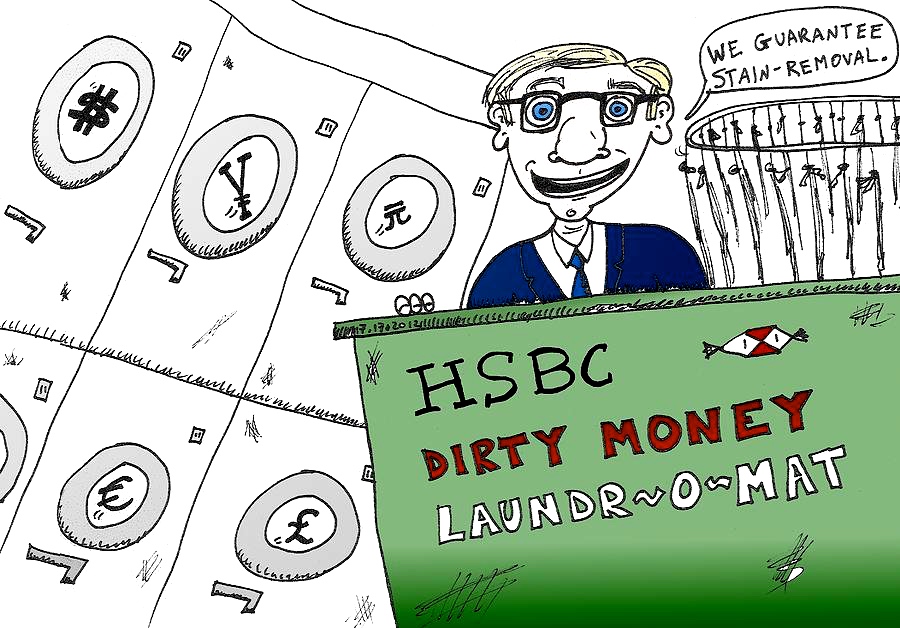SBC, the Hong Kong and Shanghai Banking Corporation headquartered in the UK, is in fresh trouble. As John Christensen, director of the Tax Justice Network and a leading authority on tax evasion, put it: “An ordinary individual caught doing what HSBC was doing would have all of their assets taken away and would go to prison.”
The week before last it came out that the company's Swiss arm was allowing wealthy customers, allegedly including drug and arms dealers, to dodge tax and hide millions of dollars in offshore accounts. Swiss, Belgian and French authorities are investigating the bank, but the UK government almost immediately refused to launch an in-depth probe.
Chancellor of the Exchequer George Osborne was criticized for laying conspicuously low after the international story broke. He finally appeared more than a week later, telling an audience at the Tate Gallery on London's South Bank that it was a matter for the “prosecuting authorities.”
“I don’t think it would be right for [me] to direct prosecutions against individuals or individual companies,” Osborne said.
Last Wednesday, Peter Oborne, the chief political commentator for the UK's leading conservative broadsheet, the Daily Telegraph, resigned over the paper's biased coverage of the case. By Friday, it became clear that the newspaper wasn't only attempting to retain its advertising revenue from the bank – but that its owners had recently received a £250 million loan from HSBC.
Oborne has called for an independent enquiry following an editorial the paper published claiming “no apology” for its actions. For now, the tale of high-level government and media collusion involving a deeply corrupt financial institution continues.
This Monday, HSBC is set to “apologize” for its actions when it releases its full-year figures for 2014. It's not the first time the bank has been in hot water over what it's doing with its clients' money. In 2012, the bank was forced to pay out $1.9 billion following allegations that it assisted Mexican drug traffickers moving their money around the financial system. A total of $881 million was laundered across HSBC bank accounts. Yet the bank was allowed to continue trading.
“HSBC has been very closely politically connected to the British government for many decades,” John Christensen of the Tax Justice Network told Occupy.com. “Right back to the opium wars, when the big British trading houses were trading opium out of India into China and the Royal Navy was used to break open the Chinese market.
"More recently, the British government was very active pushing in Washington for HSBC not to lose its license in the U.S. over the Mexican drug money scandal," he added, and "it's more than the British government being ineffective in punishing HSBC – it has a long history in being very active protecting HSBC from investigation. It is a complete dereliction of the government's duty that it refuses to look into this situation.”
But the scandal goes even further than that, Christensen said.
“We know HSBC has been involved in criminal activity, at many levels. And it's not just collusion with tax evasion and the marketing of tax evasion services to clients through their Geneva branch, not just the drug money laundering in the U.S.," he continued. "It's also their involvement with the rigging of the Libor (London Interbank offered rate) market, interest rate settlements and currency market exchanges. So they've been involved in rigging markets, avoiding drug money, laundering, and the list just goes on and on.”
So how does he feel about the Daily Telegraph being in cahoots with the bank?
“We are in a terrible situation in this country and the Telegraph isn't unique in this,” Christensen sad. “So many news and media outlets are dependent on advertising, and the financial services industry is a major source of advertising revenue. We're now in a position where we can no longer be sure that our media will be prepared to run stories like this because they're scared of losing advertising revenue. And when financial matters are commented upon, it tends to involve voices from the City of London financial circles – bringing all sorts of conflicts of interest. So we have the worst of both worlds: we have a media scared of losing its revenue which relies very heavily on these conflicted voices.”
Christensen said he's frightened that a lack of sanctions against HSBC would set the precedent for other banks and large corporations to relax their rules.
“There should be a thorough independent inquiry and the company directors should be called to account and sent to prison. The government should send out a strong message that behavior like this won't be tolerated within the company," he concluded. But, "what will actually happen is that they won't be sent to prison, and the message will go out to other banks and to the general public that banks can engage in criminal behavior with impunity because the British government will do nothing.”

No comments:
Post a Comment